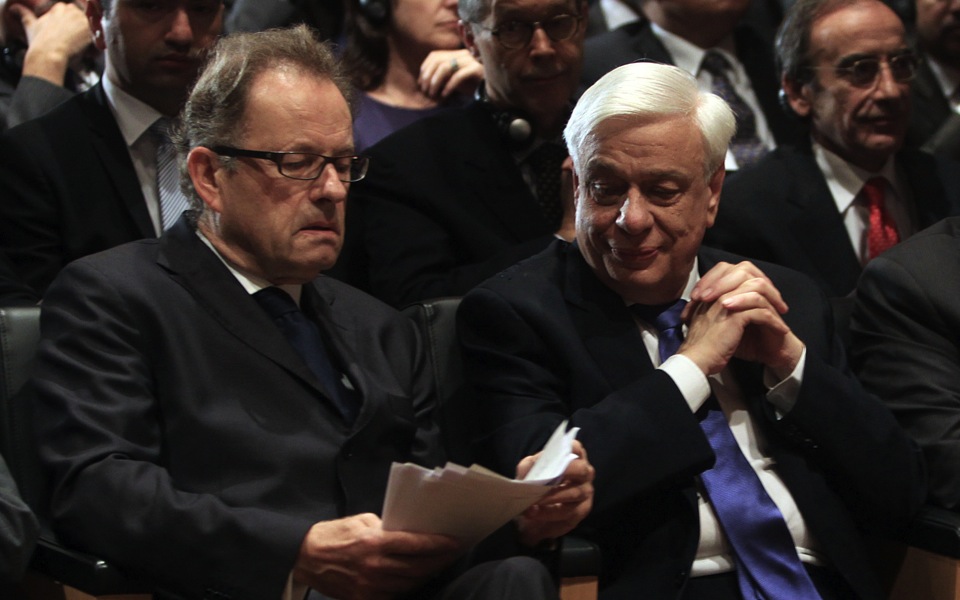Refugee crisis was not unexpected, top UN official says

Director-General of the United Nations office in Geneva, Denmark’s Michael Moller, expresses optimism that the agency’s sustainable development goals (SDGs) will help toward ending extreme poverty but he has no illusions about the refugee crisis, stressing that such phenomena will continue. On a recent visit to Athens to celebrated the UN’s 70th anniversary, he recommended that we remember the 1980s.
Does the UN Refugee Agency (UNHCR) have adequate funding?
Over 60 million people depend on the UNHCR getting the right funding. But it doesn’t. The needs have grown exponentially over the past several years. There’s donor fatigue, the humanitarian system is now dealing with four or five top-level crises, what we call Level 3, which is testing the system to its limits. The lack of funding has to do with the fragmented and inward looking national agendas, and it has to do with the fact that our approach hasn’t evolved in synch with reality.
A very, very deep rethink about the relationship between development aid and humanitarian aid is needed. A lot of what is happening now in humanitarian aid really ought to be in development aid, in the prevention side of development aid, long-term strategies. The average time a refugee is in a camp is unacceptable, it’s between 14 and 17 years.
The collective thinking about migration, refugees, doesn’t have a locus, there’s no one place where somebody is sitting thinking about new policies. The UNHCR is a technical organization, the International Organization for Migration (IOM) also. Except for Sir Peter Sutherland, the secretary-general’s special representative for migration and development, but he’s a one-man show, The crisis we have today, we knew it was going to happen. The leaders of Europe were told it was going to happen at least two years ago. So a little prevention and a little preparation in terms of the narrative to their voters would have gone a long way.
Meaning?
This very negative, xenophobic and frankly racist narrative that we’re seeing in many countries, including my own country is unacceptable, because the facts are different. The facts are that the whole of Europe – minus maybe one or two countries – needs migrants in order to keep their economies going. There’s a direct correlation between the number of migrants a country takes in and positive economic growth.
Also, one of the things that I find very puzzling is the global amnesia going on. In the early 80s we had pretty much the same problem in Southeast Asia, with much bigger numbers of boat people. It took a while and then someone decided we must deal with it in a more rational way and they came up with a plan of action which was the product of an international conference where international solidarity kicked in in a much broader way than now. Then we put in place a whole series of measures in a way that minimized the pain and over seven years we resettled 2.5 million people. I don’t see why we can’t take a page or two or three out of that book. To me what’s happening isn’t a European problem, it’s an international problem.
I don’t see the US thinking about it that way. Washington agreed to receive just a few tens of thousands of refugees.
No, no, you’re wrong. They are evolving as well. First of all, the number was 10,000 but now they’ve upped it to 100,000. I’ve talked to some of the politicians. The big change also is that in today’s world you have a lot more countries that have not only the capacity but also the need to bring in migrants than you had back in 1985.
More importantly, looking at this crisis as an isolated incident doesn’t make sense. . We are going to have more of these events and a lot worse. The moment climate refugee problems kick in there will be even greater problems , unless we sit down globally and figure out structures and ways to deal with this in the future. Not to reinvent the wheel every time that happens, but to rethink completely and strengthen the humanitarian system, because I guarantee you that it will happen again.
Is there a risk that this domino of border closures in Europe will eventually mean that large numbers of refugees are stuck in Greece?
The pipeline of information is incredibly quick, so the reaction time is very brief. Once it’s clear that there’s a blockage for the time being, they’ll find other ways. They’re finding them now already. There are incredible stories of people going through Russia to Norway by bike. So I don’t think Greece is going to be totally flooded. Turkey is hopefully going to accept keeping many of those who are coming. Maybe it’s wishful thinking.
Do you see dealing with the refugee crisis as compatible with austerity, not just in Greece but everywhere?
No. That’s just one of these perfect storm situations. The decisions to impose austerity were taken before the refugee crisis.
So is it time to change that?
I would think so.
Let’s talk about disarmament. It doesn’t sound very a la mode.
It’s not, unfortunately. The Conference on Disarmament is supposed to be the primary body of the UN system where nuclear disarmament is being negotiated. The Conference on Disarmament has not made any progress in 20 years; they can’t even agree on a program of work.
And you’re heading that?
Yes. We have to keep pushing. Particularly because there’s new technology that is really frightening . We need to agree some preventive treaties that would regulate the use of killer robots, autonomous weapons, for example – I don’t particularly want to live in a world where a machine determines if I live or die, and this is where we’re going. There’s also cyber and space-based weaponry. That has to be regulated somehow. And all the nuclear issues that remain unresolved must be dealt with as a matter of urgency. The holders of nuclear warheads are refurbishing their nuclear stockpiles. We’ve been very lucky that nothing has happened until now; it’s just a matter of time.





